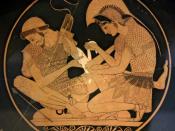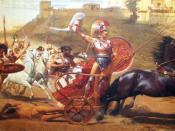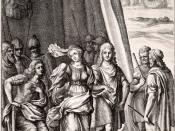In the Trojan War, it is clear that the prevailing view is that humans are at the mercy of the gods. In The Iliad, the Trojan War arises from a conflict among the gods, and the outcome is ultimately decided by the gods themselves. The gods have human-like characteristics, as they watch over their favorite mortals and have love affairs with them. Some of the gods are not as virtuous and admirable, but are rather flawed, akin to the similarities of their human counterparts. However, there is a unique distinction between the mortals and deity. Throughout "The Iliad", Homer describes the relationships between the gods, relationships between the gods and mortals, and the encompassing effect fate has an all characters.
One of the key themes in "The Iliad" is the role divine intervention plays throughout the narrative. Divine intervention occurs frequently throughout "The Iliad", and the result can be either catastrophic or fortunate.
When Chryses pleads to Agamemnon for his daughter Chryseis' safe return, Agamemnon refrains from doing so. Therefore, Chryses appeals to Apollo to spread a plague on the Achaian camp as an act of revenge. There is this perception that the gods intervene in human affairs to help serve personal motives. On the other hand, the intent of intervention is for the gods to facilitate the hands of fate. Although the gods know that they do not have the ability to manipulate fate, their overwhelming emotions often lead them to meddle in the affairs of the humans. The relationship between the gods and mortals addressed by Plato suggests that piety is the main issue that bridges the mortals and the gods. Hector exemplifies this role, as he is a man of compassion and piety. His behavior is different than the attitudes exhibited by Agamemnon and Achilles.
Of the mortals, there is a particular group known as the heroes or heroines, who possess unnatural talents and characteristics. Achilles, a brave hero in the Trojan War, is invulnerable except for his heel. Hector, the hero and prince for the Trojans, is recognized as one of the greatest fighters. These heroes and heroines are a close bridge between the mortals and the gods, as the gods often intervene to assist the hero in times of dire situations and needs. During Hector's assault on the Greek camp, he is given the strength by Zeus for storming the Trojan walls: "To the noise of their advance Zeus now added a wind from Ida's mountains that blew dust straight at the ships and the bewildered Greeks. The sky god was giving the glory to the Trojans and to Hector" (Lombardo 72). Another example of divine intervention between the gods and the heroes arises when Thetis grants her son, Achilles, a new set of weapons that are forged by Hephaestus: "And when she set the armor down before Achilles, all of the metalwork clattered and chimed... He turned the polished weapons the god had given him over and over in his hands" (Lombardo 114). As humans, the behaviors of the heroes and heroines are affected by the markedly irrational divine intervention of the gods.
One of the more important features Homer points out is the relationship between the gods. The presence of the gods provides a new perspective upon the mortals to which they govern. Their exalted power, their immortal reign free from death or suffering, and their glorious presence upon the mortals show a contrasting divide to the lives of the mortals. When the gods disagree over certain matters, they make light of the situation in a cordial way:
... Who couldn't stop laughing... They feasted to their hearts' content, Apollo playing beautiful melodies on the lyre, The Muses singing responsively in lovely voices... And the Lord of Lightning, Olympian Zeus, went to his bed, The bed he always slept in when sweet sleep overcame him. He climbed in and slept, next to golden-throned Hera (Lombardo 19).
From this situation, it is clear that the relationships between the gods and the relationships between the mortals are adversely related. The conflicts between the mortals leave a grim perspective. For example, the disputes between Achilles and Agamemnon result in hundreds of deaths.
For the mortals in The Iliad, fate primarily refers to their ends and is not a factor which prevails upon all other actions. These ends are dictated by fate and cannot be moderated by the divine gods, nor can they be averted. The Greek hero, Achilles, acknowledges that if he is to stay and fight at Troy, he is fated to die there, but his fame will endure. In The Iliad, the gods have a high level of influence over that: all events are fated to arise during the Trojan War. Hera speaks to Achilles, "This time we will save you, might Achilles, This time--but your hour is near. We are not to blame, but a great god and strong Fate" (Lombardo 120). This suggests that Zeus and the force of fate are two separate entities, both of whom have authoritative influence over a mortal. Sometimes even the seemingly boundless power of the gods to control events is eventually offset by the direction of fate.
In The Iliad, the presence of the gods show that the mortals cannot perceive the forces which the gods influence upon them. The various actions and decisions of the mortals lead to their fated end of which they are unaware. The gods, who are endowed with emotions, enable them to empathize with the mortals allowing both to understand
each other. Heroes such as Achilles understand that mortal life is bitter and bleak; the best hope is that one can be remembered through fame by falling honorably in battle. In contrast, the jovial relationships between the gods and the grim battles the mortals engage through The Iliad create a distinct and opposing outlook on the events during the Trojan War.


